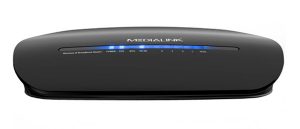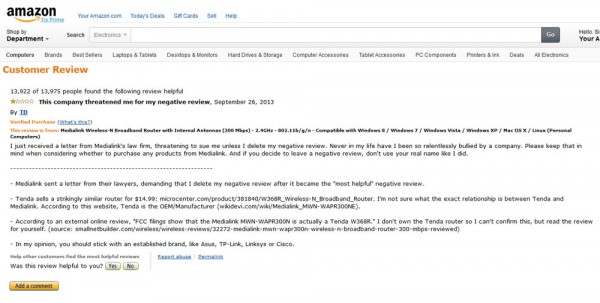 The company Medialink is threatening to sue a man who left a negative review of a Medialink product on Amazon.com, which in the end may actually prove to be a true review due to a re-branding of a Tenda router by Medialink.
The company Medialink is threatening to sue a man who left a negative review of a Medialink product on Amazon.com, which in the end may actually prove to be a true review due to a re-branding of a Tenda router by Medialink.
“Your statements are false, defamatory, libelous, and slanderous, constitute trade libel and place Mediabridge and its products in a false light,” – Medialink’s law firm
In the unbelievable lawsuit threat letter, Medialink’s lawyers say they will be “requesting all of your records, correspondence, telephone and cell records, e-mails, texts, Instant Messages, and all other files, documents and records (both electronic and hard copy) related to Mediabridge, your postings on Amazon.com and other web sites, your communications with others about Mediabridge and it’s products.”
They have also demanded that the commenter “place a Litigation Hold on all of your files, both business and personal, in order to preserve all such documents and information, files, e-mails, hard drives, disks, computer drives, laptops, netbooks, smartphones, thumbdrives, backup systems, cloud storage, or any other sources of information and/or files which may contain any communications, documents, or records related to the claim and/or Mediabridge.”
Read the full threat letter here.We have read about others that left bad Medialink reviews who said that the company tried to bribe them with gift cards to change the bad reviews, and it also seems that since the bad review was rated as the “most helpful” negative review that people, probably working for Medialink have been flooding the site with questionable 5-star reviews for the same Medialink Wireless-N Broadband Router. Just look at the date when the positive reviews started, and you’ll probably feel as I do that there’s a lot of shady stuff going on with these Amazon reviews.
The re-branding claim in the original negative review seems to be confirmed by a filing with the FCC, in which Medialink directly says that the equipment is “electrically identical” to one made by Chinese manufacturer Tenda, which is believed to contain a hidden “backdoor” which could allow attackers to “take over” the router and send it commands.
You can bet that the whole company will soon be re-branding, otherwise I don’t see them making many more sales.
Personally, I will never purchase any Medialink products, and plan to stay away from Amazon.com as well, due to the threats against this commenter and the seemingly underhanded way both companies deals with bad reviews.
The next time you write an online review, be careful. You might get sued.
That’s what could happen to a Florida man who left a negative review about an Internet router he purchased. According to his Tuesday post on Reddit, where he’s asking for legal advice, he received a letter from a law firm in Philadelphia threatening to sue him for an “illegal campaign to damage, discredit, defame, and libel” the company that makes the router.
“Your statements are false, defamatory, libelous, and slanderous, constitute trade libel and place Mediabridge and its products in a false light,” the verbose letter from the law firm reads in part.
In his review, which has since been edited, the man made several allegations, including that many of the positive reviews about the product on Amazon might be fake and that the router itself was “identical” to a router from a different company.
If the man doesn’t take down his review within three days, cease all Internet conversation about the product, and agrees to never buy the company’s products again, the law firm will sue him, according to the letter. But by going to Reddit and not keeping quiet, the man might have already sealed his fate.
Companies, it turns out, have every right to sue people who write reviews on websites that they may feel are libelous or defamatory.
While there is a level of legal protection that third-party websites (in this case, Amazon) have from being sued, which come from Section 230 of the Communications Decency Act—the same section that protects websites that show revenge porn—the authors of those reviews are not protected.
Neither the letter nor the user can be confirmed. Still, this isn’t the first time that someone has taken legal heat for online reviews.
In 2012, a Virginia court sided with a contractor who received a negative review from a woman on Yelp, claiming defamation. The woman who wrote the review said the service was poor and accused the contractor of stealing her jewelry. She was sued for $750,000.
In 2011, a book author sued a man, though unsuccessfully, who wrote negative reviews about his book on Amazon. And in 2006, a woman in Florida won $11.3 million in a lawsuit resulting from defamatory remarks on an Internet message board.
So while Amazon states in its terms of use that sellers “may not ask buyers to remove negative reviews,” these companies do have legal protections to go after comments they may deem libelous.
While the Internet allows users a certain amount of anonymity behind reviews on Amazon or Yelp—where a negative or positive review can determine a company’s success—there is still a danger that companies will take legal action against these reviews. For this Florida man, his gripes with this company will only grow.
Stand Up To Government Corruption and Hypocrisy – usbacklash.org

